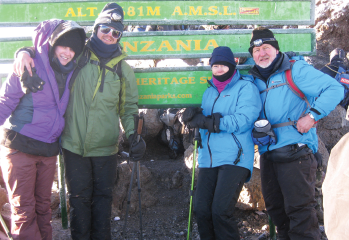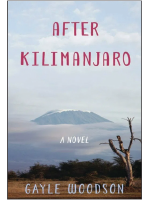Gayle Woodson, MD, is a writer. Her first novel, After Kilimanjaro, was published in October 2019 (She Writes Press) and earned great reviews, including one from Kirkus Reviews stating that the story is “begging for a sequel.” She is also professor emerita and a former chair of otolaryngology at Southern Illinois University School of Medicine in Springfield.
Explore This Issue
December 2019Now 69, Dr. Woodson lives on Merritt Island in Florida with her husband, Tom Robbins, after retiring from academics in 2015. There, Dr. Woodson writes and volunteers at a local medical clinic for people without health insurance called Space Coast Volunteers in Medicine. She and her husband also travel to Tanzania twice a year to work with and mentor early-
career otolaryngologists with the Tanzania Medical Society.
Dr. Woodson talked to ENTtoday about how she got her start in writing and what inspires her.
ENTtoday: Your first novel, After Kilimanjaro, was published late last year. What is the story’s inspiration?
Dr. Woodson: The book is inspired by the work my husband and I do in Tanzania, but it is not a memoir. We are old guys who rebooted the otolaryngology residency program at the Kilimanjaro Christian Medical Centre there. The heroine in my book, Sarah Whitaker, is a young general surgery resident who takes a break year in Tanzania and winds up teaching traditional midwives in a remote mountain village.

Dr. Woodson and her husband, Tom Robbins, on the right and their daughter Sarah and son Nick on left, on Mount Kilimanjaro.
© Dr. Woodson
ENTtoday: Will there be a sequel?
GW: It was not something I intended to do. I am currently editing a novel set in Texas that is an attempted murder mystery, with a victim in a coma from anoxic brain damage, in a small town devastated by the opioid epidemic. But my beta readers all said they wanted more. So now I am researching the sequel, wherein After Kilimanjaro’s heroine ventures into the Congo. (I wish I were brave enough to go there!) This is actually a spoiler; in After Kilimanjaro, Sarah gets into some hairy and potentially fatal situations. Having a sequel makes it obvious that she survives.
ENTtoday: How did you get interested in writing? What authors do you like?
GW: As a child, I was a bookworm—the kind of kid who read under the covers with a flashlight. Madeleine L’Engle’s A Wrinkle in Time was amazing, and I liked Marguerite Henry’s work. As I got older, I read some James Thurber, some Ray Bradbury, and I really liked Kurt Vonnegut. I always dreamed of writing a book. When I went to college, I intended to be a journalist and started out majoring in English. But I became fascinated with molecular genetics and physiology. Then came the woman’s liberation movement, and medical school began to open up to women.
When I went to college, I intended to be a journalist and started out majoring in English. But I became fascinated with molecular genetics and physiology. Then came the woman’s liberation movement, and medical school began to open up to women. —Gayle Woodson, MD
I was surprised I liked surgery so much; it wasn’t like egos against egos, but everybody working together. When I rotated to the otolaryngology service at Baylor College of Medicine, the chairman there was Bobby Alford. I was so impressed by how he interacted with patients and how conscientious he was. He was an icon in the field of otolaryngology.
I kept writing scientific articles and books, but I had little time for fiction until my four children (all now adults) were grown and I retired from academics.
Today, I read broadly to see how other authors write. I’ve enjoyed Sharon Bala’s The Boat People, about how we view immigrants in the age of terrorism. Another favorite is Abraham Verghese’s Cutting for Stone, a medical saga. I also liked Charles C. Mann’s 1491 and 1493, about how much was going on in the world before Columbus’ arrival, and much of Malcolm Gladwell’s Blink and The Tipping Point.
ENTtoday: What other works have you written, and what do you typically write about?
 GW: Aside from more than 150 journal articles, I have published a number of short stories online, with varied topics from overflowing toilets to nuclear holocaust. I have a blog about random things, like when my robot vacuum attacked my handheld shark, or my three days in the hospital for a cat bite. After Kilimanjaro is my first published novel.
GW: Aside from more than 150 journal articles, I have published a number of short stories online, with varied topics from overflowing toilets to nuclear holocaust. I have a blog about random things, like when my robot vacuum attacked my handheld shark, or my three days in the hospital for a cat bite. After Kilimanjaro is my first published novel.
ENTtoday: Has medicine prepared you for a career as a writer?
GW: My medical career certainly gave me a lot of material for writing. And the academic writing was good discipline, especially writing and editing abstracts. Cutting out unnecessary words is essential to writing clearly; crafting a 200-word limit to summarize a paper is great exercise in being concise.
Writing is a popular hobby/second career for physicians. I belong to a Facebook group of women physician writers. The American College of Surgeons has a writers’ section. I think you get better at writing by reading and writing things, and getting feedback on your work, not from your friends or spouse, but by being in writers’ groups. Loving writing is the easy part; the hardest is marketing, getting an agent, getting published, and getting people to buy your work.
Cheryl Alkon is a freelance medical writer based in Massachusetts.